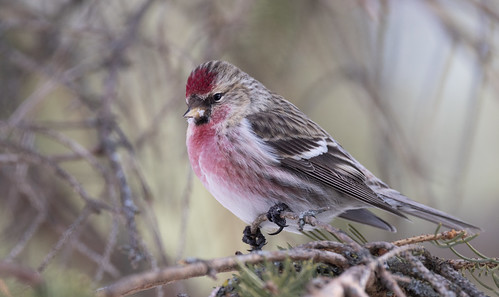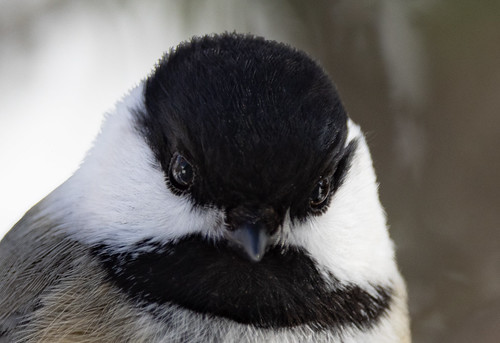For the past few weeks, I’ve been hearing from people thrilling to flurries of redpolls at their feeders, in many cases eating literally out of their hands. The fun of these large flocks can’t be overstated. My dear friend Tim Larson, who's had them come to his hands, said, “It's like a horde of tiny Shriners is holding its convention at my place, bringing their irrepressible, effervescent spirit to these strange days.”
It’s hard to articulate the visceral joy many of us feel when we make a genuine, even if momentary, connection with the natural world. When a wild bird’s sparkling eyes meet mine, the connection shoots electrical impulses straight to my heart—I can actually feel it skipping a beat or two. And when a little songbird alights on my finger, its tiny, sharp claws send out the same kind of electrical sparks that fly in descriptions of falling in love.
The redpolls in my yard this year are getting their food from my feeders, not my hands. Some years I've hand-fed my chickadees, and some of those individuals remember me from year to year, which I love. And while I’ve been hand-feeding chickadees over the years, I’ve had both species of nuthatches, a Downy Woodpecker, and a few Pine Siskins alight on my hand, too.
Three of the most thrilling experiences I’ve ever had while birding were when a Ruby-crowned Kinglet, a Golden-crowned Kinglet, and a Pine Grosbeak alighted on my hand, no food involved at all. I don’t think either of the kinglets even knew I was a living thing. Both kinglet episodes happened when I was standing at the edge of a hedge on frozen mornings during spring migration, and neither bird looked at my face at all. For them, my hand was just another perch as they darted among the branches searching for breakfast.
The Pine Grosbeak encounter was magically different. That young male and I whistled back and forth before we saw each other, and after we made eye contact, still whistling back and forth, he kept coming closer while looking directly at me. When he finally alighted on my hand, still looking into my eyes, he lingered for what seemed like an endless moment, then flew alongside me for a short while before moving on to the rest of his life.
If he'd been a human, people would call this a bad breakup and say he ghosted me. But being as how he was a bird, our magical time together wasn’t the least bit tainted by its brevity or the permanence of its ending, and will always remain firmly embedded in my heart.
When anyone falls in love, we can’t help but want the object of our affections to love us back. The chickadees in my neighborhood clearly recognize me, and one particular little guy seems especially drawn to me, approaching inches from my face to catch my attention whenever the window is open, or hovering at my eye level just outside the glass whenever I’m standing at the closed window. When I'm working at my desk, he gives me a long, hard stare from the spruce tree in hopes that I'll notice him.
But fun as it is to imagine him loving me back, chickadees do not squander their love on humans—his attraction for me is entirely entwined with his associating me with fresh mealworms. I’m sure he feels toward me they way a person might feel toward a favorite grocer or a reliable neighbor—genuine affection, but nothing like the love we feel for our dearest family and friends.
People we see regularly, even when we don’t know them, often become entwined in the fabric of our daily lives as we start recognizing them and trusting their predictability. I’m sure that’s how most of my backyard chickadees regard me, and that’s plenty good enough. They don’t love me, so I don’t expect them to do anything at all to make my life better. “To love” is an active verb, and my love for them, even if unrequited, demands that I do what I can to make their lives safer and easier.
I know people who yearn to be loved but are far too guarded to give of themselves, at least when it comes to other humans. But people who love birds and other wildlife must act on that love, or it isn't genuine love. Of course, as Tommy Smothers sang so long ago on the album Free to Be You and Me, "some kinds of help is the kind of help we all can do without." Hand-feeding our backyard birds feels so right to us that it's hard to realize that in some situations, and for some birds, hand-feeding is outright harmful. How do we distinguish which situations feeding birds will be bad, neutral, or genuinely beneficial?
Next time, I’ll talk about the birds we should never ever try to hand-feed, and about a lovely approach to hand-feeding articulated by my friend Mark Roser in his book, Laughing Birds, A Guidebook to Interactive Bird Feeding.







